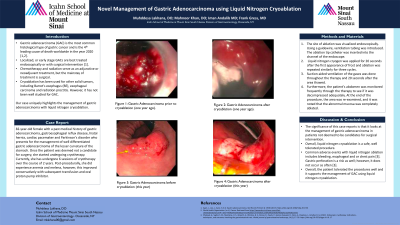Monday Poster Session
Category: Interventional Endoscopy
P2339 - Novel Management of Gastric Adenocarcinoma Using Liquid Nitrogen Cryoablation
Monday, October 23, 2023
10:30 AM - 4:15 PM PT
Location: Exhibit Hall

Has Audio
- ML
Muhddesa Lakhana, DO
Mount Sinai South Nassau
Valley Stream, NY
Presenting Author(s)
Muhddesa Lakhana, DO, Mahnoor Khan, DO, Iman Andalib, MD
Mount Sinai South Nassau, Oceanside, NY
Introduction: Gastric adenocarcinoma (GAC) is the most common histological type of gastric cancer and is the 4th leading cause of death worldwide in the year 2020 [1,2]. Localized, or early stage GACs are best treated endoscopically or with surgical intervention [1]. Chemotherapy and radiation serve as an adjunctive or neoadjuvant treatment, but the mainstay of treatment is surgical. Cryoablation has been used for other solid tumors, including Barret's esophagus (BE), esophageal carcinoma and radiation proctitis. However, it has not been well studied for GAC. Our case uniquely highlights the management of gastric adenocarcinoma with liquid nitrogen cryoablation.
Case Description/Methods: 82-year-old female with a past medical history of gastric adenocarcinoma, gastroesophageal reflux disease, hiatal hernia, cardiac pacemaker and Parkinson's disorder who presents for the management of well differentiated gastric adenocarcinoma of the lesser curvature of the stomach. Once the patient was deemed not a candidate for surgery, she started undergoing cryotherapy. Currently, she has undergone 6 sessions of cryotherapy over the course of 2 years. Post-procedurally, she did experience anemia and melena, however, this improved conservatively with subsequent transfusion and oral proton pump inhibitor.
During this procedure, the site of ablation was visualized endoscopically. Liquid nitrogen cryogen was applied for 20 seconds after the first appearance of frost and ablation, and it was repeated similarly for three cycles. Suction-aided ventilation of the gases was done during the procedure. Furthermore, the patient’s abdomen was monitored throughout the therapy to see if it was decompressed adequately. At the end of the procedure, the area was re-examined, and it was noted that the abnormal mucosa was completely ablated.
Discussion: The significant of this case reports is that it looks at the management of gastric adenocarcinoma in patients not deemed to be candidates for surgical intervention. Overall, liquid nitrogen cryoablation is a safe, well tolerated procedure. Common adverse events with liquid nitrogen ablation includes bleeding, esophageal and chest pain. Gastric perforation is a risk; but, it does not occur as often. Overall, the patient tolerated the procedures and supports the novel management of GAC using liquid nitrogen cryoablation.
1.Ajani, J.,et al. Gastric adenocarcinoma. Nat Rev Dis Primers 3, 17036 (2017).
2.WHO: WHO. (2022). Cancer. www.who.int. https://www.who.int/news-room/fact-sheets/detail/cancer.
Disclosures:
Muhddesa Lakhana, DO, Mahnoor Khan, DO, Iman Andalib, MD. P2339 - Novel Management of Gastric Adenocarcinoma Using Liquid Nitrogen Cryoablation, ACG 2023 Annual Scientific Meeting Abstracts. Vancouver, BC, Canada: American College of Gastroenterology.
Mount Sinai South Nassau, Oceanside, NY
Introduction: Gastric adenocarcinoma (GAC) is the most common histological type of gastric cancer and is the 4th leading cause of death worldwide in the year 2020 [1,2]. Localized, or early stage GACs are best treated endoscopically or with surgical intervention [1]. Chemotherapy and radiation serve as an adjunctive or neoadjuvant treatment, but the mainstay of treatment is surgical. Cryoablation has been used for other solid tumors, including Barret's esophagus (BE), esophageal carcinoma and radiation proctitis. However, it has not been well studied for GAC. Our case uniquely highlights the management of gastric adenocarcinoma with liquid nitrogen cryoablation.
Case Description/Methods: 82-year-old female with a past medical history of gastric adenocarcinoma, gastroesophageal reflux disease, hiatal hernia, cardiac pacemaker and Parkinson's disorder who presents for the management of well differentiated gastric adenocarcinoma of the lesser curvature of the stomach. Once the patient was deemed not a candidate for surgery, she started undergoing cryotherapy. Currently, she has undergone 6 sessions of cryotherapy over the course of 2 years. Post-procedurally, she did experience anemia and melena, however, this improved conservatively with subsequent transfusion and oral proton pump inhibitor.
During this procedure, the site of ablation was visualized endoscopically. Liquid nitrogen cryogen was applied for 20 seconds after the first appearance of frost and ablation, and it was repeated similarly for three cycles. Suction-aided ventilation of the gases was done during the procedure. Furthermore, the patient’s abdomen was monitored throughout the therapy to see if it was decompressed adequately. At the end of the procedure, the area was re-examined, and it was noted that the abnormal mucosa was completely ablated.
Discussion: The significant of this case reports is that it looks at the management of gastric adenocarcinoma in patients not deemed to be candidates for surgical intervention. Overall, liquid nitrogen cryoablation is a safe, well tolerated procedure. Common adverse events with liquid nitrogen ablation includes bleeding, esophageal and chest pain. Gastric perforation is a risk; but, it does not occur as often. Overall, the patient tolerated the procedures and supports the novel management of GAC using liquid nitrogen cryoablation.
1.Ajani, J.,et al. Gastric adenocarcinoma. Nat Rev Dis Primers 3, 17036 (2017).
2.WHO: WHO. (2022). Cancer. www.who.int. https://www.who.int/news-room/fact-sheets/detail/cancer.
Disclosures:
Muhddesa Lakhana indicated no relevant financial relationships.
Mahnoor Khan indicated no relevant financial relationships.
Iman Andalib indicated no relevant financial relationships.
Muhddesa Lakhana, DO, Mahnoor Khan, DO, Iman Andalib, MD. P2339 - Novel Management of Gastric Adenocarcinoma Using Liquid Nitrogen Cryoablation, ACG 2023 Annual Scientific Meeting Abstracts. Vancouver, BC, Canada: American College of Gastroenterology.
